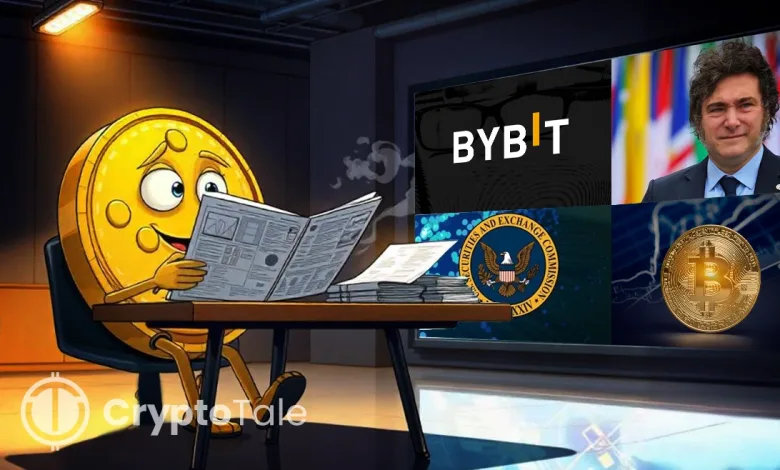The Blockchain Bulletin, Feb 24: Bitcoin, Ethereum, and Solana Face New Challenges

Hey folks! Welcome to the latest edition of The Blockchain Bulletin. Here is a quick recap of all the major highlights that took place in the crypto space over the week. Bybit, which faced a massive hack on Friday, resumed its withdrawal system 12 hours after the hack. Further, it announced the launch of a new API to update a list of suspicious wallet addresses. According to reports, North Korea’s Lazarus Group is linked to the hack. On the other hand, the official Twitter account of Myanmar’s top leader and acting president Min Aung Hlaing is suspected to have been hacked, and a large number of memecoin CAs were released.
The now-defunct firm FTX initiated its repayments to creditors. However, some jurisdictions, which included Russia, China, Egypt, Ukraine, and Nigeria were not eligible for the distributions. Sharing his opinion on the repayments, FTX CEO Sam Bankman-Fried stated in an interview that the firm never went bankrupt but experienced a liquidity crisis. Further, he stated that the crisis caused market panic and made it impossible to cash out funds. Considering the repayments, analysts have pointed out that it could largely affect the Bitcoin price.
In a twist of events, Jack Dorsey was considered to be Satoshi Nakamoto, the founder of Bitcoin. Considering his past involvement with cryptocurrency and his engagement in the cypherpunk movement strengthens the Bitcoin inventor theory. Meanwhile, Altvest Capital, a South African investment management company, became the first African country to adopt Bitcoin as a primary reserve asset.
Related: Dubai Grants MANTRA a VASP License to Lead Asset Tokenization
Earlier in the week, Argentina President Javier Milei was accused of market manipulation. Allegations suggest Milei promoted the Libra token before its value plummeted, triggering a wave of lawsuits. The situation intensified as Milei denied any involvement, claiming he never endorsed the token. Meanwhile, Davis Portnoy, a key figure in the Libra token launch, is under scrutiny for allegedly removing initial funds before the crash. Following the heist, Portnoy revealed that a three-stage promotional plan was outlined for the heist which unexpectedly faltered. On the other hand, Portnoy dumped his $GREED tokens, crashing its price by 99%, and quickly launched another token $GREED2 after investors lost their funds in the dip.
Security remains a major concern, as multiple platforms have suffered breaches. The recent hack of Cardex resulted in the loss of 470,000 ETH due to a private key compromise. Another alarming incident involved a fake Eliza token scam, which emerged after the ai16z founder’s X account was hacked, raising concerns over fraudulent projects exploiting high-profile figures. On the regulatory front, the SEC has been making significant moves, including pausing its cases against Coinbase and Binance as part of a regulatory shift. This decision comes amid a broader review of crypto ETFs, with the SEC also evaluating staking options for Ethereum-based ETFs. In a related development, the SEC closed its investigation into OpenSea without taking any action, Following the developments, the SEC has formed a cyber unit dedicated to tackling crypto fraud.
Considering its stance on saving government expenditure, the Department of Government Efficiency (DOGE) has entered a regulatory battle, investigating the SEC over the alleged mishandling of social security data linked to crypto scandals. Meanwhile, Bitcoin continues its dominance, outperforming all major assets since 2011. The cryptocurrency’s growth trajectory remains strong as institutional interest rises.
El Salvador has further bolstered its holdings, purchasing 1.6 BTC daily and increasing its reserves to 6,081 BTC. Ethereum and Solana remain in the spotlight as they battle for stablecoin dominance. Market analysts predict Ethereum could reach $2,850, while Solana targets $178 before experiencing a potential pullback. However, Solana’s sentiment has hit a three-month low due to growing bearish outlooks.
Hong Kong is actively strengthening its crypto sector, unveiling the ASPIRE roadmap to support blockchain innovation. The city’s stablecoin race is heating up, with Standard Chartered taking a lead in shaping the market, while Tether is planning a $1.24 billion stake in Adecoagro, a major agricultural company. The firm has also signed an MoU with Guinea to promote blockchain growth, signaling its expansion into new sectors. BNB has expanded its reach, going live on HashKey Global with free trading for users. Additionally, Binance has announced of delisting AMB, CLV, STMX, and VITE tokens from February 24.
In the broader market, traders are closely watching Ethereum’s last liquidity exit, predicting price movements between $6K and $8K in the long term. Meanwhile, Shiba Inu’s whale activity has plummeted, raising questions about the meme coin’s future. On the other hand, the rise of MANTRA (OM) has caught investor attention, with the asset surging 530% since October. Analysts debate whether this marks a correction or the beginning of a new high. In a nutshell, as the crypto market evolves, these events highlight the industry’s rapid changes, from security threats and regulatory shifts to market trends shaping the future of digital assets.




